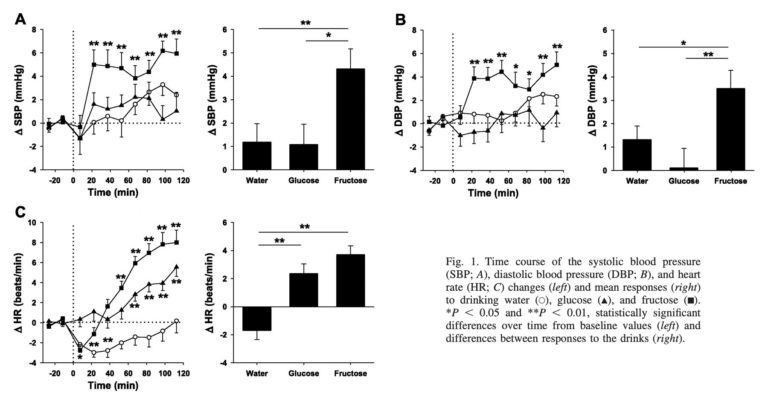In this small study looking at the acute impact of fructose consumption, authored by Clive M. Brown of the University of Fribourg, Switzerland, et al., 15 healthy, normal-weight volunteers were given one of three drinks—water, 60 g of glucose in water, or 60 g of fructose in water—on three separate occasions. (Thus, each subject consumed all three but in random order; tests were at least three days apart.) Lemon juice was used to minimize differences in taste.
Consuming fructose led to significantly greater increases in both systolic and diastolic blood pressure than glucose or water, and both glucose and fructose led to increased heart rate (with fructose showing a larger increase that did not reach significance). Both fructose and glucose also led to a temporary increase in resting energy expenditure.
Brown et al. report: “Our main finding was that oral ingestion of a fructose drink initiated a significant elevation in blood pressure for at least 2 h after the drink. In contrast, no blood pressure increase was observed after ingesting a glucose drink. Compared with glucose, ingestion of fructose also resulted in greater increases in heart rate and pressure-rate double product, an index of myocardial oxygen demand. These results support the concept that ingestion and metabolism of different sugars elicit specific patterns of hemodynamic responses.”
The researchers note insulin stimulates peripheral vasodilation, and this contributes to the impact of fructose on blood pressure. Fructose ingestion elevates heart rate without elevating insulin, and thus, without inducing peripheral vasodilation. This exacerbates its impact on blood pressure.
These results do not, however, indicate whether fructose has a different impact from glucose on long-term blood pressure or cardiovascular risk; additionally, it is worth noting pure fructose (as was given in this study) is rarely consumed, and the effects of sucrose (a combination of fructose and glucose) might differ.
Comments on Fructose Ingestion Acutely Elevates Blood Pressure in Healthy Young Humans
On top of it's correlation to fatty liver, fructose doesn't have a lot going on for itself! Thanks for posting this article.
While it is true that fructose has a low glycemic index and does not cause an insulin spike. Fructose specifically will lead to fatty liver, insulin resistance and type 2 diabetes.
Would love to see long term study in this one.

Fructose Ingestion Acutely Elevates Blood Pressure in Healthy Young Humans
3